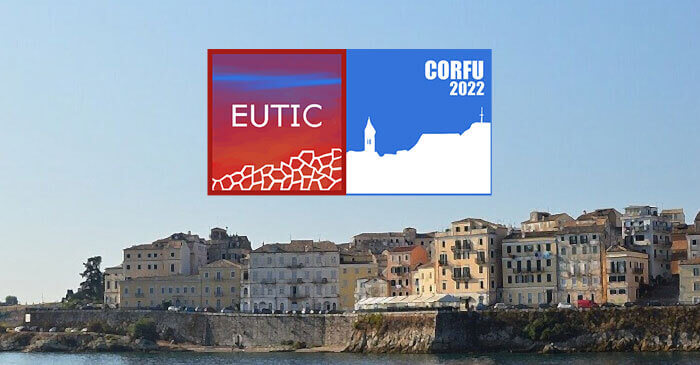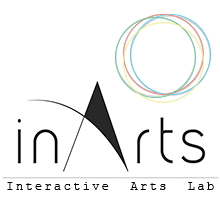17th International Conference EUTIC: Hybrid, in Corfu and Online - October 13-14-15, 2022.
28-09-2022 13:19
The European Multidisciplinary Research Network on the Challenges and Uses of Information and Communication Technologies (EUTIC) is glad to announce the hybrid 17th edition of the EUTIC International Conference "In the Intersection of Art, Science and Technology: Dialogos between Humans and Machines", organized by the Department of Audio and Visual Arts, Ionian University (Greece).
Members of the Interactive Arts Laboratory belong to the Organizing Committee of the Conference and support its works.
Venue: Ionian Academy in Corfu, Greece
Online: Teleconference and live streaming
In the Intersection of Art, Science and Technology: Dialogos between Humans and Machines
A series of relatively recent transformative events has rapidly, and in some cases violently, embedded and institutionalized technological advances across a vast spectrum of societal exchanges and structures. These contemporary radical changes occur in the intersection of well-established artificial dualities and distinctions (including the digital, the analog, the tangible, the virtual, the hybrid, the human, the machine), re-inventing proximities and re-defining beings and identities. The boundaries of the status quo of various systems have been challenged. The boundaries of some systems become permeable and flexible enough for the systems to survive and afford the novelty, whilst the inertia of other systems prevents them from successfully adapting.
In EUTIC 2022, the focus is on the transformations that occur in the intersections of Art, Science and Technology. At the crux of these transformations lie the practices of communicating and linking, rather than merging, distinctions. For example, the technological advancements further facilitated interdisciplinarity and transdisciplinarity, thus maximising the potential for theorizing and applying, for modelling and problem solving. In art, AI and robotics allow the creations to be creators, to develop aesthetics, to be subjected to human art criticism and emotions. At the same time, the boundaries between the human and the machine are also being re-defined at a biological level, questioning, for example, the notion of (dis)ability. The radically transformed lived present is echoed in scientific and in dystopic or utopic art productions, thus bringing to the fore wide discussions about nature, culture, ethics, the human, the machine, the posthuman, the cyborg, the organic, the inorganic, the individual, the collective. In education, aspects of these transformation are echoed in approaches like ST(R)E(A)M and inclusive educational practices, thus contributing to their incorporation within the constituting factors of the contemporary and future societal structures.
EUTIC 2022 embraces transformative change by providing a communicational space within which fruitful exchanges of different perspectives may occur. Dialogos seems to be fundamental in promoting this idea. Dialogos refers to the act of conversation, deriving from the Greek words dia and logos. Dia means through, suggesting motion, movement and directedness. Logos refers to discourse, but its use and meanings span across the Greek language as it is linked with diverse societal practices and processes, including reasoning, logic and rationale. For example, in the ancient polis the citizen was a ‘subject’ to the logos (ypologos), i.e. the common, public argued meaning. Isocrates stresses that “because there has been implanted in us the power to persuade each other and to make clear to each other whatever we desire […] we have come together and founded cities and made laws and invented arts” (Isoc. To Nicocles 3.6). Hence, dialogos essentially widens the boundaries to become the space that enables the communication and co-existence of distinct others (disciplines, beings, structures), thus allowing the multi-directional communicational exchanges of diverse constituting communities, practices, signs and meanings.
Non-exhaustive topics:
Aesthetics of science and technology
Interculturality and digital ecosystems
Algorithmsand intelligence in arts and in education
Mediatised communication and its new forms
The study of processes and ethics
Socio-economic changes and collective intelligence
Communication and management of the digital transition
Training for digital uses and dynamics of development
Outsourcing of resources, cloud computing, open data, open archives
Life with algorithms and digital conditioning
Digital exclusion and digital-illiteracy
(Dis)ability, e-health, prosthetics, bionics
Cyborgs and humanity
History and culture of the cyborg
Cyborgs, goddesses and identity
Gaming, cyborgsand digital narration
Killer robots and digital dehumanization
Love, intimacy and romantic robots
Emotional machines
Connected objects, augmented reality, transhumanism
AI, gender and design
Digital persuasion, digital makeup and deepfakes
Territorially smart uses of digital technologies
ICT in ecology and climate change
Digital ecosystems, eco-digital culture and eco-communication
Mind uploading
Science and fictionin the AI era
New skills for the digital world
Back


